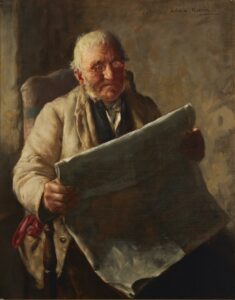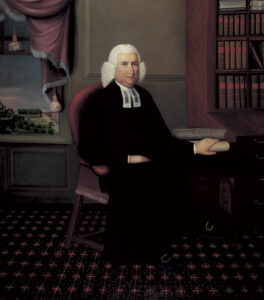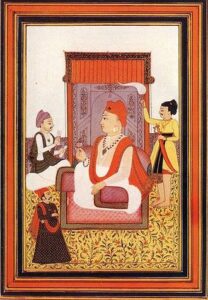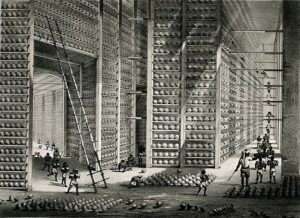Americanism Redux
August 31, your today, on the journey to the American Founding, 250 years ago, in 1773
Well, well, at last the news has arrived in London. The effects of imperial-colonial disputes in Boston and Massachusetts have crossed the ocean. Today, 250 years ago, a London newspaper prints a report on the letters of Governor Thomas Hutchinson and Lieutenant Andrew Oliver secretly leaked back in the spring to readers in Boston and throughout the British colonies. In a spirit favorable to the colonial rights movement, the London writer speculates that the imperial government has come dangerously close to launching a war against the colonies. The writer recommends immediate removal of Hutchinson and Oliver from their posts.
(learning of New England)
The London newspaper account is one-half of the bi-directional trans-Atlantic news flow. It’s a counterbalance to very brief reports and rumors—drip, drip, drip—about Parliament’s newest laws reforming and upholding the British East India Company. The price of tea will be lowered for customers in the British colonies, while enforcement of purchases of non-EIC tea providers will be more stringently enforced. Further, the British imperial government will provide a massive financial loan to the EIC, tied to various administrative and organizational reforms. East-to-west and west-to-east, information about present conditions in the British imperial-colonial relations skims along the surface of the Atlantic.
The man or woman known as “P.P.” isn’t part of this flow and he or she is upset about it. P.P is the name of an essay writer in a Boston newspaper. P.P.’s article today pertains to a political issue that everyone else is ignoring, or so the essayist asserts. The issue is a rumored agreement among local lawyers in Cumberland County, Massachusetts (future Maine) to restrict the types of cases they will take before a judge. The writer declares that such a restriction undercuts the rights of Cumberland’s men and women who should be able to seek legal redress for various grievances and violations. P.P. proclaims respect for lawyers and hopes that public pressure can restore these basic individual rights to colonists and proper ethics to the legal profession. “I expect the Ill Will of some,” the writer concludes, “but if I have the approbation of any that will undertake to free their Country from the expected Oppressions, I have my Desire.”
(do it the right way)
It’s money, not legal rights, that the Mohegan Native Joseph Johnson worries about today, 250 years ago. He needs money and he’s down to his last chance. He’s written to the preacher-teacher who changed his life, Eleazar Wheelock. Wheelock had converted Johnson to Christianity and taught him basic English and math at his Native evangelizing school in the British colony of New Hampshire. Johnson has asked Wheelock for funds to help him travel west as a quasi-missionary to Native tribes belonging to the group the British call “the Six Nations” in the western regions of the New York colony. Johnson wants to spread the word about Christianity. Nevertheless, Johnson is caught between two worlds of his earlier life as a non-Christian Native and his current life as a Native convert to Christianity. Johnson states that he’s uncomfortable asking his Native friends for money but also has difficulty convincing British colonists to give him financial support. Trying to draw upon whatever advantage he has, Johnson inserts a brief description of his life for use with other potential funders, emphasizing his experiences in the “delusive world” and especially his journeys on the “ocean wide” to Puerto Rico, the Virgin Islands, Antigua, and elsewhere in the Caribbean Sea. Johnson prays that with this biographical story perhaps Wheelock can evangelize a different sort of message, the message of the need of one Native man, Joseph Johnson.
(Eleazar Wheelock)
The luck that Joseph Johnson is missing seems to be turning in John Connolly’s direction. Connolly double-checks with an acquaintance he knows well to see if his instinct is accurate, that good fortune awaits him. He’s received assurances from the British governor of Virginia, Lord Dunmore, of his (Connolly’s) new ownership of 2,000 acres next to the Falls of the Ohio. Connolly believes Dunmore is trustworthy, upright, and a person of vast experience and knowledge, “of benevolence and universal charity.” With the image of 2,000 Ohio valley acres dancing in his head, Connolly is ready to hire a person to be his representative in the Falls region, to lay out tracts for farming, homes, and more. Like the Mohegan Johnson with preacher-teacher Wheelock, Connolly perceives a personal gain can be found with a personal connection, in his case, the British governor of Virginia. He’s counting on Dunmore.
(Falls of the Ohio)
From the perspective of Boston and London, it’s a day of the remotes and the life people hope to make there, or to make better there. Remote northeastern Massachusetts. Remote western New York. Remote Falls of the Ohio. And back at the centers of the Anglo-American world, back at Boston and London, the problems of empire and colony remain, tense and quivering, and the latest news flowing this way and that.
Also
Three rooms comprise a new office, today 250 years ago. In the King’s Head Inn on New Street in Birmingham, England, the Birmingham Assay Office opens for business. Matthew Boulton is elated with this fact as the employer of 700 workers producing silver-based products. The new Assay Office will provide for agreed-upon testing for purity and composition as well as the hallmarking to imprint the Boulton brand. Boulton lobbied key members of Parliament to enact the new law that led to the Office. Boulton’s business is a symbol of the town’s fire-engine enthusiasm for economic activity, a new type of community devoted to harnessing energy sources, production techniques, and efficiency standards. The town will be the epicenter of a new age, The Industrial.
(Modern New Street)
Narayanrao, a leader in the Maratha Empire in modern-day western India, is one day dead. He is a murder victim, slain by a family member. Nearly a century old, the self-Hindu ruling Maratha Empire, or Confederacy, has been in duress ever since the late 1750s. Tensions and violence between the Maratha and the British East India Company have been constant. Wars between the Maratha and Afghans, Jats, Mughals, and other British-allied native tribes have been equally constant; an uprising burns within the empire day-by-day. Narayanrao’s death makes a volatile situation all the more unstable and unpredictable.
(Narayanrao)
The British East India Company (EIC) has other actions today east of the Maratha Empire. The EIC has discovered that locally grown opium can be sold to Indian merchants who can then transport and resell the commodity to a rising market of customers in China. The profits of the EIC-Indian-China opium trade are enormous and only look to grow bigger. Chinese opium customers are quickly becoming Chinese opium users who are quickly becoming Chinese opium addicts. Opium has the potential to rival tea as a mainstay of the EIC as it destroys the inner health of Chinese culture.
(East India Company opium storage, pre-shipment)
For You Now
What makes the world what it is?
Creation is an obvious answer. The hard surface has great heights and vast depths. Water covers most, land appears partly, and the air covers all. Things are within and among, living, unliving, no longer living. The place has a nature.
And then there’s us. We have a surface, too, and inside we have heights and depths to which we rise and fall. We’re called and condemned. Like the place, the people have a nature, shifting and enduring at the same time.
Before the people is a person. One at a time. One alone, one with another, one with many others. Creation reveals the imprint of people and person alike, standing on the heights and sinking in the depths.
On this day in 1773, 250 years ago, those who live in a particular place have a reach far beyond themselves. The inhabitants of England and the British Isles are at the early stages of a great revolution in the world’s life, the Industrial Revolution rooted, in part, at Birmingham. Not many years will be needed before the Industrial Revolution sails the oceans’ surface. Even without it, the spread of English-British influence has already extended to North America, to the swath of land above the Indian Ocean, and around the world’s tallest mountains to China, carried ahead by salt water first and fresh water second. The people in all three places will react to the influence. Above them, in the stars and their courses, a revolution will occur in rotation and turning. Among them, beneath the stars, the same potential exists. Within them, person by person, it is no less true.
Composed of persons, the people hold together by sharing a place. While they’re together in the place, they share other things as well. A way of thinking, a way of living, a way of seeing each other. Those ways have a shape like the world—they have heights and depths, hard surfaces and wet coverings. Those ways will not stay the same. Like Johnson and Connolly, two persons going different places, people can leave and move, split apart and then split apart again.
They are fallen stars, tracing revolutions across the world, by land and water and air.
Suggestion
Take a moment to consider this: what is shared by Americans and holding us together in our current place?
(a river splits at the delta)















